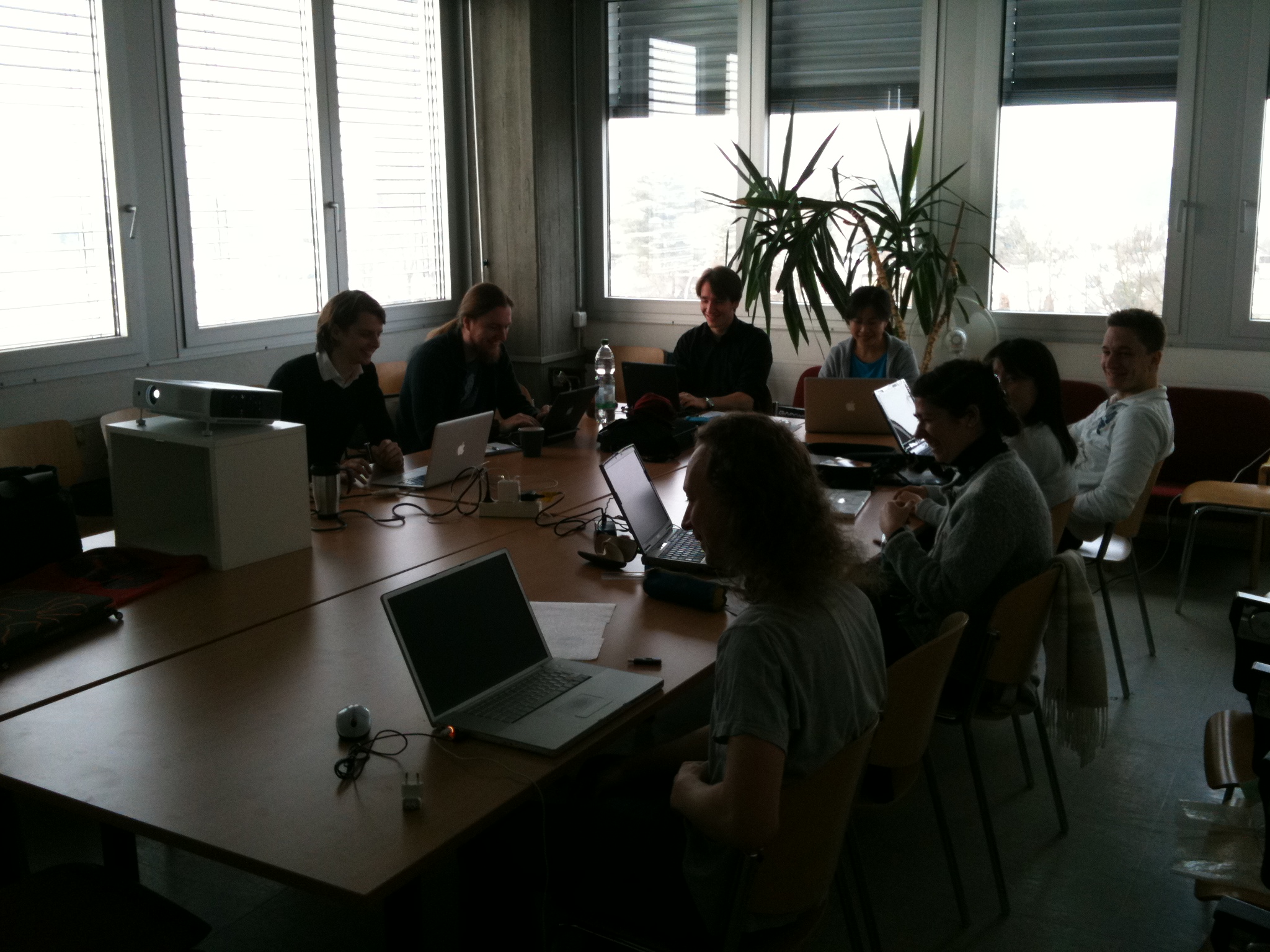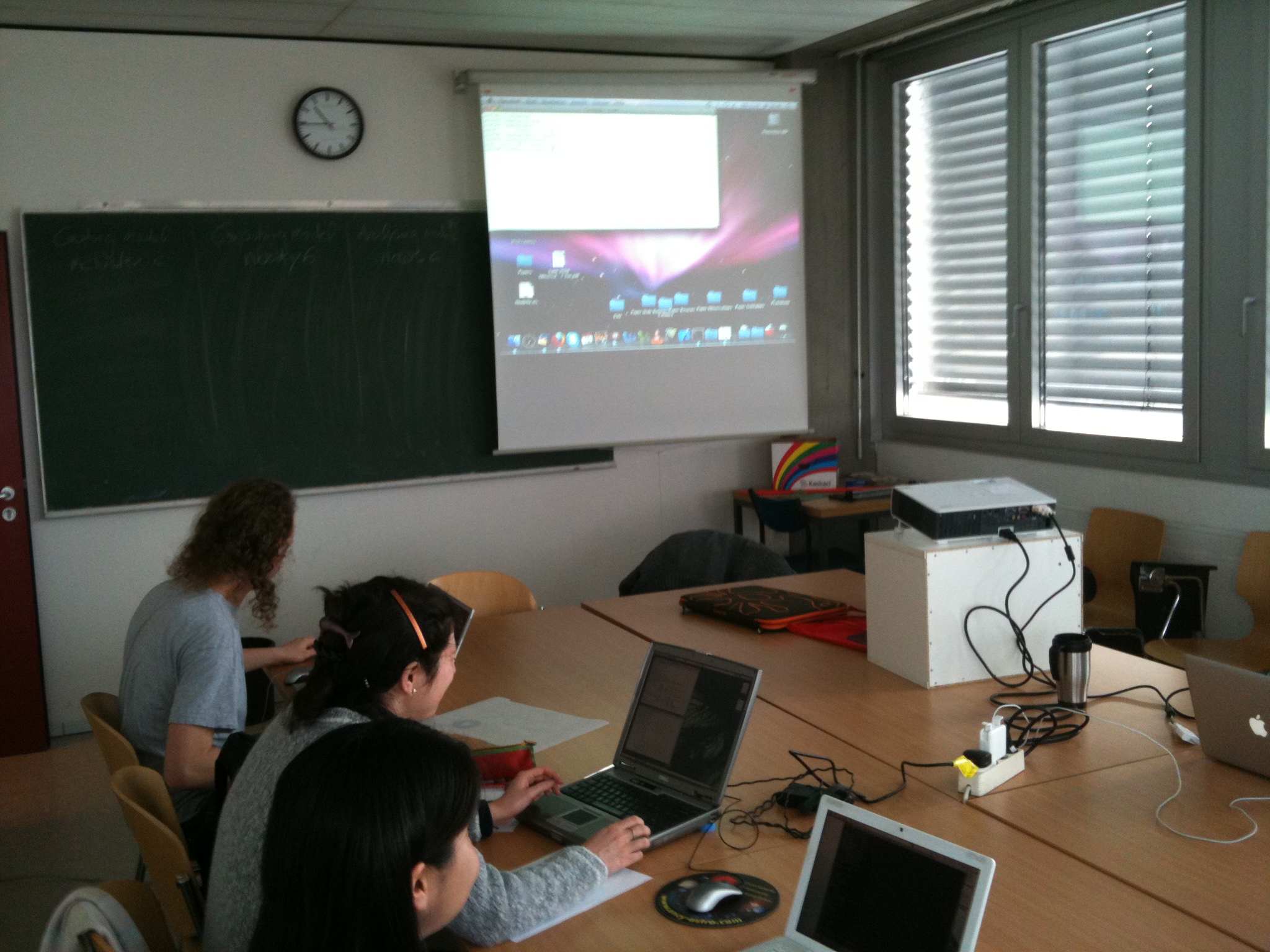Tutorial:
or
Instructor:
Tutor:
Hours per week:
Credit points:
Prerequisites (unless exempted):
Contents:
- Foundations of stellar dynamics
- Binary and multiple stars, their distribution functions and dynamical evolution
- Energy exchange channels in star clusters
- Star-cluster birth
- Star cluster evolution
- Star-cluster death
- Origin and dynamical properties of galactic-field populations
- Dynamics of starbursts
- Origin of dwarf galaxies
- Galactic field stellar populations
Schedule (subject to change)
Literature:
- Galactic Dynamics by J.Binney and S.Tremaine (1987, Princeton University Press)
- Dynamics and Evolution of Galactic Nuclei by D.Merritt (2013, Princeton University Press)
- Dynamicsl Evolution of Globular Clusters by Lyman Spitzer, Jr. (1987, Princeton University Press)
- The Gravitational Million-Body Problem by Douglas Heggie and Piet Hut (2003, Cambridge University Press)
- Gravitational N-body Simulations: Tools and Algorithms by Sverre Aarseth (2003, Cambridge University Press)
- Initial Conditions for Star Clusters by Pavel Kroupa (2008, Lecture Notes in Physics, Springer)
- The stellar and sub-stellar IMF of simple and composite populations by Pavel Kroupa (2013, Stars and Stellar Systems Vol.5, Springer)
- The universality hypothesis: binary and stellar populations in star clusters and galaxies by Pavel Kroupa (2011, IAUS 270, p.141)
Comment:
The vast majority of stars form in less than one pc sized groups or clusters, i.e. in embedded star clusters from the clumps of molecular clouds. These initially contain from a dozen to millions of binary stars. The embedded star clusters are far denser than galactic field populations. Knowledge of the distribution and properties of these dense stellar systems and of the dynamical processes within them is important for understanding the properties and kinematics of stellar populations in and around galaxies.This course gives an outline of the birth and dynamical evolution of star clusters, and of the dynamical processes acting within these dense stellar systems. The content of this course encompasses the energy equipartition process, stellar evolution, dissociation of binary systems and the acceleration of stars to high kinetic energies. Knowledge of these issues is useful for the understanding of star formation because most of the observed stars in galactic fields have been dynamically processed in their birth dynamical structures/in their embedded star clusters. This knowledge is also useful for understanding the kinematical and dynamical properties of galactic field stellar populations which differ in different galaxies. The integrated galactic initial mass function (IGIMF) theory and other integrated galactic field problems are taught.
2a) Numerical Dynamics by Dr. Jan Pflamm-Altenburg (astro854; 4CP)
For further information see basis and/or ecampus and/or contact Dr. Jan Pflamm-Altenburg: jpa _at_ hiskp.uni-bonn.de
Comments:
The aim of this course is to impart knowledge how different stellar dynamical systems such as planetary systems, non-hierarchical few-body systems, star clusters and galaxies are integrated numerically. The students will learn what kind of algorithms are used to integrate a particular stellar system as well as how to use state of the art software for scientific research.2b) Introduction to MoND by Dr. Jan Pflamm-Altenburg (astro850)
For further information see basis and/or ecampus and/or contact Dr. Jan Pflamm-Altenburg: jpa _at_ hiskp.uni-bonn.de
Comments:
The aim of this course is to introduce the mathematics of Milgromian dynamics (MOND, originally known as "Modified Newtonian Dynamics", except that Nature does not modify its gravitation). Like Newtonian dynamics, MOND has been inspired by observational data. Unlike Newtonian dynamics, MOND takes into account the observational constraints from the Solar System and galaxies. Therewith MOND is a more inclusive modern non-relativistic formulation of gravitation that was not available to Einstein when he formulated a relativistic version of Newtonian gravitational dynamics. MOND trivially (i.e., w/o any additional adjustments) accounts for all phenomena attributed to dark matter in the context of Einstein/Newtomnian graivtation. Since all predictions made by MOND have been verified by observations until now while the existence of dark matter has been falsified with more than 5 sigma confidence, a physicist ought to be knowledgeable on MOND.3) Lecture: Astrophysics of Galaxies (astro821; 6CP)
Registering, time and place:
Schedule
Lecturers:
Tutors:
Tutorials (begin: week of April 14th )
Hours per week:
Prerequisites:
Contents:
- The types of galaxies;
- Foundations of stellar dynamics (Jeans equation, relaxation time);
- Elliptical galaxies (structure and evolution);
- Disk galaxies (structure and evolution);
- Stellar populations in galaxies;
- Formation of galaxies;
- Dwarf galaxies (normal dwarfs, tidal-dwarfs, ultra-compact dwarfs);
- Galactic nuclei and their supermassive black holes;
- Dark matter and alternatives to Newtonian gravity.
Literature:
- Galactic Dynamics by James Binney and Scott Tremaine (1987,Princeton University Press)
- Galactic Astronomy by J.Binney and M.Merrifield (1998,Princeton University Press)
- Galaxies in the Universe by L. Sparke and J. Gallagher (2000, Cambridge University Press)
- Dynamics of Galaxies by G. Bertin (2000, Cambridge University Press)
- Dynamics and Evolution of Galactic Nuclei by David Merritt (2013, Princeton University Press)
- The Dark Matter Problem by Robert H. Sanders (2014, Cambridge University Press)
- Modified Newtonian Dynamics (MOND): Observational Phenomenology and Relativistic Extensions by Benoit Famaey & Stacy S. McGaugh (2012, Living Reviews in Relativity)
- A Philosophical Approach to MOND by David Merritt (2020, Cambridge University Press)
- A modern view of galaxies and their stellar populations by Pavel Kroupa (2023, Springer International, 2023 arXiv:2310.01473)
- The many tensions with dark-matter based models and implications on the nature of the Universe by Pavel Kroupa, Eda Gjergo et al. (2023, Corfu2022 proceedings, arXiv:2309.11552)
Seminar on stellar systems: star clusters and dwarf galxies (6953)
Time and place:
Instructors:
Scheine / certificates:
This course is worth 4 credit points. The corresponding certificate ("Schein") is awarded if the student (a) attends the seminar and (b) holds a presentation. The certificate can be picked up in the office of Mrs Elisabeth Danne on the third floor at the end of the semester.For:
Hours per week:
Contents:
Literature:
Comments:
Students and postdocs meet once a week for a presentation and discussion of a relevant recent and published research results.Seminar on theoretical dynamics (6952)
Time and place:
Instructor:
Scheine / certificates:
This course is worth 4 credit points. The corresponding certificate ("Schein") is awarded if the student (a) attends the seminar and (b) holds a presentation. The certificate can be picked up in the office of Mrs Elisabeth Danne on the third floor at the end of the semester.For:
Hours per week:
Contents:
- Formation of planetray and stellar systems
- Stellar populations in clusters and galaxies
- Processes governing the evolution of stellar systems
Comments:
Students and post-docs present the current state of their own research to a critical audience.Seminar on theoretical dynamics B
Time and place:
Instructor:
For:
Hours per week:
Contents:
- Formation of planetray and stellar systems
- Stellar populations in clusters and galaxies
- Processes governing the evolution of stellar systems
Comments:
Students and post-docs present the current state of their own research to a critical audience.Learning to use Nbody6 / Superbox / Phantom of Ramses (PoR)
Time and place:
Instructor:
For:
Contents:
- Learn to use Sverre Aarseth's Nbody6 ("collisional") code for star-cluster applications (e.g. massive stars in cluster cores, evaporation of brown dwarfs, evolution of young clusters)
- Learn to use the Bien/Fellhauer/Kroupa/Metz Superox/Superbox++ ("collisionless") code for galactic-dynamics problems (e.g. evolution of satellite galaxies, galaxy-galaxy encounters, massive star-cluster complexes).
- Learn to use the Phantom of Ramses (PoR) code to do full-scale galaxy and cosmological simulations with star formation in MOND ( Lueghausen, Famaey & Kroupa 2015 ).
Comments:
The learning sessions take place with other students/postdocs acquainted with the codes, and intend to prepare the participants for research problems needing stellar dynamics as a tool (e.g. for the interpretation of GAIA data).

The above two images show the Nbody class on February 10th, 2010, organised and lead by Andreas Kuepper and Seungkyung Oh, on the 3rd floor of the Argelander-Institute.